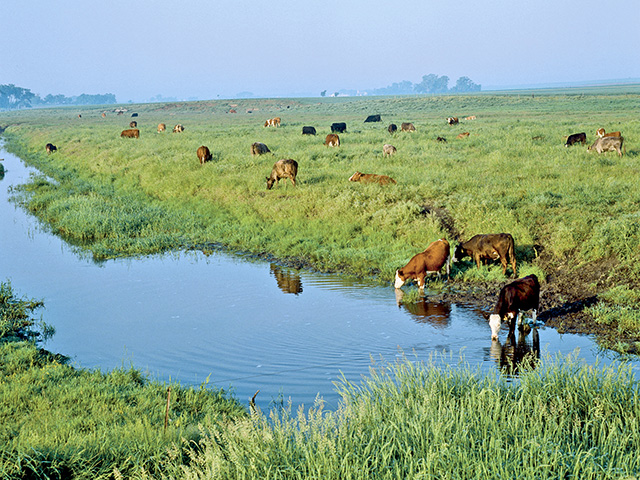Injunction Sought Against Water Rule
NM Cattle Group Wants Court to Prevent Enforcement on Tributaries, Wetlands
OMAHA (DTN) -- Alleging farmers and ranchers face potentially "crippling liability" as a result of the new Navigable Waters Protection Rule, the New Mexico Cattle Growers' Association on Tuesday asked a federal court to issue a preliminary injunction against parts of the rule.
The cattle producers argue the new rule from EPA and the Army Corps of Engineers will force ranchers to "spend months to years, and tens to hundreds of thousands of dollars, to obtain Army permits to farm and otherwise use their own land." The group wants to block parts of the rule from going into effect in June.
The group wants the court to stop EPA and the U.S. Army Corps of Engineers from enforcing the rule when it comes to intermittent tributaries and "non-navigable" wetlands if they don't abut navigable waters.
"With the frequent presence of intermittent drainages and other temporary water features on their land, cattle growers will either have to forego plowing and other earth-moving operations in and around these features or obtain prohibitively expensive permits to eventually proceed (after multi-year waits) with those operations," the motion for an injunction argues.
"If they proceed with their operations without permits, they face crippling liability. Because permitting takes more than two years on average, cattle growers will be unable to legally engage in any earth-moving operations on their own property wherever they encounter intermittent drainages and other temporary water features for at least two years."
The Navigable Waters Protection Rule is set to take effect on June 22.
The New Mexico Cattle Growers' Association filed an amended lawsuit against the Trump administration rule in April. The original lawsuit in the U.S. District Court for the District of New Mexico also targets the 1986 Clean Water Act regulation, alleging both versions illegally regulate non-navigable ponds, wetlands and tributaries.
P[L1] D[0x0] M[300x250] OOP[F] ADUNIT[] T[]
The cattle producers group makes the cases that the U.S. Supreme Court has already ruled in Rapanos v. United States, that similar provisions in prior regulations went beyond the scope of the Clean Water Act.
In 2007, the plurality on the Supreme Court held waters of the United States could only refer to "relatively permanent, standing or flowing bodies of water" and not "occasional," "ephemeral" or "intermittent" flows.
Delays getting permits would prevent ranchers from working their own land even if there are issues that demand fast actions because of weather or other challenges. Even seasonal work on ranches could be delayed waiting for federal agencies to issue permits, the group stated.
The cattle group said the particular provisions in the new rule "routinely occur" on farms, ranches and other lands.
"Those properties are or may legally be used for a wide variety of land uses and purposes, as an aspect of property ownership and affirmed under New Mexico law," the motion said.
The New Mexico Cattle Growers' Association originally filed a lawsuit in November 2019 challenging the 1986 regulation. The challenge came after the EPA finalized a repeal of the 2015 rule, because the repeal reverted back to the 1986 rule until the most recent rewrite was completed.
The amended lawsuit alleges the 1986 and 2020 rules are "arbitrary and capricious, and contrary to law, in violation of the Administrative Procedure Act."
The lawsuit asks the court to declare "several provisions of the Clean Water Act, the 1986 Regulations, and related guidance, and/or the Navigable Waters Protection Rule, are statutorily and constitutionally invalid, and to enjoin their enforcement."
Despite several attempts to rewrite the definition of waters of the United States, the lawsuit said the new definition still misses the mark.
The group said in its lawsuit that both the 1986 and 2020 definitions contain an "overbroad and illegal" definition of the navigable waters.
The suit said the Supreme Court in the Rapanos case rejected the regulation of tributaries based on an ordinary high-water mark. The court found the method would have extended EPA jurisdiction of "virtually any land feature" where rainwater or drainage passes.
In addition, the Supreme Court also ruled on Solid Waste Agency of Northern Cook County v. Army Corps of Engineers that isolated waters that would have no connection and would not be navigable-in-fact could not be regulated.
Last year, a number of environmental and conservation groups filed a lawsuit in the U.S. District Court for the District of South Carolina challenging the repeal of the 2015 rule. That lawsuit is led by the South Carolina Coastal Conservation League, Natural Resources Defense Council, National Wildlife Federation and others.
That lawsuit claims federal agencies violated the Administrative Procedure Act in promulgating the repeal rule and merely reverting back to the 1986 rule instead of reintroducing it for public comment.
Todd Neeley can be reached at todd.neeley@dtn.com
Follow him on Twitter @toddneeleyDTN
(c) Copyright 2020 DTN, LLC. All rights reserved.




